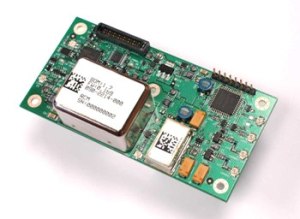Jun 10 2014
Jackson Labs Technologies, Inc., a designer and manufacturer of cutting-edge gps, timing, and frequency equipment today announced the availability of its breakthrough product the RCM Frequency Reference.
 Jackson Labs Technologies’ RCM Frequency Reference
Jackson Labs Technologies’ RCM Frequency Reference
The RCM module is typically used as a local oscillator for Radar applications requiring ultra-low phase noise. The RCM module offers dual isolated 100MHz Ultra-Low Phase-Noise outputs with +20.5dBm output power with a Phase Noise of only -100dBc/Hz at 10Hz offset from the 100MHz carrier, and a phase noise floor of -172dBc/Hz. The RCM module also offers an ultra-stable 10MHz CMOS output, and complete handling of external 1PPS, 10MHz, and NMEA Time/Date signals making it perfect for Radar and synchronized Radio applications and for phase-noise-filter applications for Rubidium or Cesium references.
The RCM module allows external 10MHz or 1PPS signals to tightly phase-lock the internal oscillators to the optional external reference, filtering-out the phase noise in the process. The phase lock to an external 10MHz reference is near instantaneous, and allows generating 1PPS and 100MHz output signals with better than 2.5ns uncertainty and less than 250 picoseconds rms wander on the 1PPS output versus the 10MHz reference input. The RCM module contains a Double Oven SC-cut crystal oscillator (DOCXO) with ultra-low-g sensitivity (less than 0.3ppb per g per axis) which provides both low-tilt as well as low-vibration sensitivity, and a very low drift when an external reference is not connected. Drift rates of better than 0.5ppb per day are standard, and holdover drift performance of better than 4 microseconds for 24 hours can be achieved. Allan Deviation (ADEV) of 2E-012 for one second averages are typical. The low-g 100MHz crystal oscillator is phase-locked to the 10MHz DOCXO and thus provides extremely good phase noise performance while also being disciplined by the high-stability 10MHz oscillator for improved close-in phase noise and ADEV performance. This setup allows exceptional typical performance of down to -75dBc/Hz at 1Hz, -100dBc/Hz at 10Hz, and -130dBc/Hz at 100Hz offset from the 100MHz carrier as well as a phase noise floor of -172dBc/Hz. The high-isolation/high-output power of the dual 100MHz outputs allows direct connection to typical Harmonic Comb Generators without requiring external amplifiers, or directly driving external passive splitters.
The RCM module provides complete handling of 1PPS signals with 2.5ns resolution allowing 1PPS generation phase-locked to the 100MHz output even in the absence or failure of the external 1PPS or 10MHz references. In the event of an external 10MHz reference failure the RCM module provides auto-switching from the external 10MHz to the external 1PPS reference, and finally into a crystal-compensated holdover flywheel state should both external references fail. GPS receivers can be directly connected to the RCM module for disciplining via the 1PPS input. The RCM module contains a Real Time Clock driven by the ultra-stable DOCXO that can maintain time and date with typically better than 4us precision per day in holdover mode, and generates 1PPS signals in NMEA format for easy integration into legacy systems. SCPI English language commands can be used to control and monitor the RCM module via the internal RS-232 port. The RCM module runs from a +12V power supply, can operate from -40C to +85C, is ruggedized, and is available for immediate sampling.